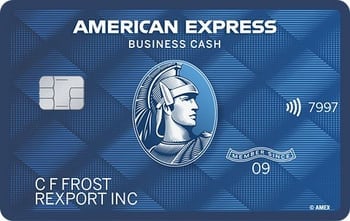How to Get a Business Credit Card: Who Qualifies, What You Need to Apply
If you have good to excellent credit and do some work for yourself, you may qualify for a business credit card.

Many, or all, of the products featured on this page are from our advertising partners who compensate us when you take certain actions on our website or click to take an action on their website. However, this does not influence our evaluations. Our opinions are our own. Here is a list of our partners and here's how we make money.
Lots of people, including freelancers and brand-new business owners, can get business credit cards. Personal credit is the most important part of your application. But you’ll also need to provide information about your identity and your business’s age, size and industry.
Here’s what to know about qualifying for and getting a business credit card.
Who can get a business credit card?
Anyone who works to earn money on their own (not from an employer) can get a business credit card. As soon as you start operating, you have a “business” — even before you have a business entity or any business income.
That includes:
- Freelancers and side hustlers. If you earn income from gig work — like driving for a ride-hailing service, selling crafts or walking your neighbors’ dogs — you operate a business. If you haven’t created a business entity, like an LLC, your business is considered a sole proprietorship. That’s a valid business type for credit card applications.
- New business founders. You can apply for a business credit card before you have business income (but your personal income will be part of your application). In fact, credit cards can be a useful tool for managing cash flow while you build your business. Look for a business card with a 0% intro APR period to give yourself some time to develop revenue streams.
What do you need to qualify for a business credit card?
In general, you need good or excellent credit to qualify for business credit cards. That means a personal FICO score of 690 or higher.
Qualifications generally don’t include a minimum amount of revenue or time in business. So whether you operate a startup or a mature business, your personal credit score matters most.
| Needed get a business card | Not needed to get a business card |
|---|---|
| Good to excellent personal credit. | Business entity. |
| Proof of your identity (e.g. Social Security number or Individual Taxpayer Identification Number). | Business revenue. |
| Employer Identification Number. | |
| Business credit score. | |
| Months or years of operations. |
Business credit card application requirements
Card issuers will most likely require the following information.
Personal information:
- Name, date of birth and Social Security number: Financial institutions are required to verify your identity to help prevent money laundering.
- Address, email and phone number: The issuer will use this to contact you about your account.
- Annual income: Include all income, not just what you make from your business. This amount may help determine your credit limit.
Information about your business:
- Business name and contact information: Give the full legal name of your business, along with the address and phone number used to register your business. Sole proprietors can use their own name, and home-based businesses can use the home address.
- Time in business: Applications will ask for the date your business was established or the number of years in business.
- Number of employees: Don’t count yourself.
- Business category and type: This is typically a dropdown menu. Choose what most closely aligns with your business.
- Business structure: Note whether you’re a corporation, partnership, sole proprietorship, limited liability corporation or nonprofit organization.
- Federal tax ID: Your employer identification number, individual tax identification number or Social Security number, depending on your business.
- Business revenue and expenses: List your annual business revenue (put $0 if you don’t have any yet) and provide an estimate of how much you would charge to the card each month.
As part of the application process, you’ll also most likely have to provide a personal guarantee. This is a promise that, if your business can’t pay the bill for your business credit card, you’ll be on the hook for it personally.
How long does it take to open a business credit card?
You can apply for a business credit card online in a few minutes. Some applications get approved more or less immediately. That’s most common if you have excellent credit or a personal card or bank account with the institution.
Approval can take longer, though. The card issuer may reach out for more information or review your application manually, depending on its eligibility criteria. Your issuer should provide a phone number you can call to check the status of your application.
For businesses with $1 million or less in annual revenue, card issuers must mail you a decision within 30 days of receiving your completed application.
Once you’re approved, the issuer will mail the card to your address. This can take up to 10 business days.
What business credit card should you get?
The right card for you will depend on your business’s specific needs. But if you’re not sure what those are yet, a cash-back business credit card with no annual fee is a good starting point.
Cash-back cards are among the most versatile because you can typically redeem rewards as a statement credit or deposit them into a bank account as cash. If you don’t spend heavily in one specific category, a flat-rate card is a good choice. These cards earn the same rewards rate on everything.
Our editorial team’s top overall card is the Ink Business Unlimited® Credit Card. It earns unlimited 1.5% cash back on all purchases, has a long intro APR period and doesn’t charge an annual fee.
Can you get a business credit card with bad credit?
You can get a business credit card with bad credit, but the options are limited. A secured business credit card will likely be your best bet if your FICO score is below 630.
Using a secured business card can help you build business credit. But most lack other perks, and they won’t increase your spending power. You provide a deposit that determines your credit limit.
In this instance, start by getting a secured card to help build your personal credit. Then, wait to apply for an unsecured business credit card down the road once you have more options.
Should you get a business travel credit card?
A business travel credit card can make sense if you spend a lot of time on the road (or in the air). These cards earn extra points on travel-related expenses and can offer traveler-friendly perks like lounge access and airline credits.
Business travel cards tend to have higher annual fees than cash-back options. Some cost hundreds of dollars to carry. If you’re not sure if you can justify that cost, consider starting with a less expensive option.
For instance, the U.S. Bank Business Altitude® Connect Visa Signature® Card has a solid welcome offer and no annual fee for the first year ($95 after that). It offers these rewards: Earn 5X points on prepaid hotels and car rentals booked directly in the Travel Center when using your card. Earn 4X points on travel, gas and EV charging stations* on the first $150,000 in combined annual spend (*excludes discount stores/supercenters and wholesale clubs). Earn 2X points on dining, takeout, restaurant delivery and cell service providers. Earn 1X points on all other eligible spend.
Should you get more than one business credit card?
There are benefits to having multiple business credit cards. A big one is maximizing rewards. Cash-back cards with bonus categories deliver great value when they align with your spending habits.
The Ink Business Cash® Credit Card is a good example: Earn 5% cash back on the first $25,000 spent in combined purchases at office supply stores and on internet, cable and phone services each account anniversary year. Earn 5% total cash back on Lyft rides through 9/30/27. Earn 2% cash back on the first $25,000 spent in combined purchases at gas stations and restaurants each account anniversary year. Earn 1% cash back on all other card purchases with no limit to the amount you can earn.
You might also want an extra card for a specific benefit. For instance, a 0% introductory APR period can help you finance a large purchase or pay off existing debt interest free. The U.S. Bank Triple Cash Rewards Visa® Business Card is a good choice. It offers 0% intro APR on Purchases and Balance Transfers for 12 billing cycles, and then the ongoing APR of 17.24%-26.24% Variable APR.
Ready to choose for a business credit card?
See our overall favorites, or choose your business type to find the best options for you.
Frequently Asked Questions
Can you get a business credit card for a side hustle?
Yes, you can get a business credit card if you do freelance or gig work. If you earn money as an independent contractor, you technically operate a business.
Can startups get business credit cards?
Yes, new businesses can get business credit cards. You don’t need a business plan or any business income to qualify. The application will ask for your personal income, though.
Who can get a business credit card?
Any business owner can apply for a business credit card. That includes sole proprietors, freelancers, gig workers and independent contractors.
Having a dedicated credit card for your small business makes it easy to separate business and personal expenses, identify tax deductions and build your business credit history.
What credit score do you need to get a business credit card?
You typically need a personal FICO score of at least 690 to be approved for a business credit card. Some require an even higher score.
Secured business credit cards, on the other hand, typically don’t have a minimum credit score requirement. And you can qualify for a corporate credit card without a personal credit check, though these have minimum revenue and annual spend requirements. They’re designed for large businesses, not individuals.
Article sources
NerdWallet writers are subject matter authorities who use primary,
trustworthy sources to inform their work, including peer-reviewed
studies, government websites, academic research and interviews with
industry experts. All content is fact-checked for accuracy, timeliness
and relevance. You can learn more about NerdWallet's high
standards for journalism by reading our
editorial guidelines.
On this page
- Who can get a business credit card?
- What do you need to qualify for a business credit card?
- Business credit card application requirements
- How long does it take to open a business credit card?
- What business credit card should you get?
- Can you get a business credit card with bad credit?
- Should you get a business travel credit card?
- Should you get more than one business credit card?







